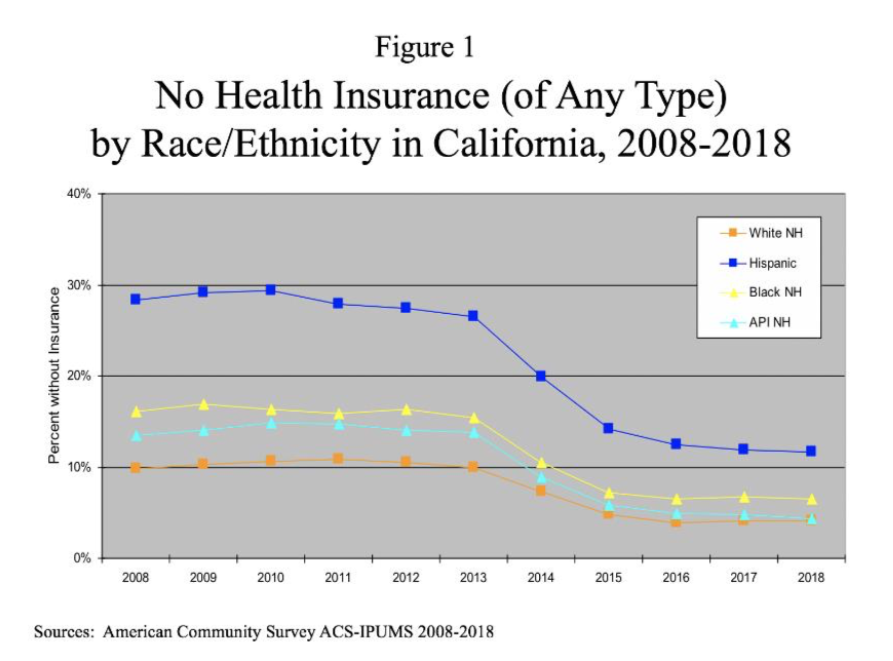By David E. Hayes-Bautista, Ph.D., Paul Hsu, M.P.H, Ph.D.
“Seek treatment by calling your doctor” if you have a fever, dry cough, or breathing difficulties, says the State of California Department of Public Health. But how will you pay for the doctor’s examination, a coronavirus test, and, if you test positive, any subsequent costs for treatment for COVID-19? While much of the state’s population has been able to practice “social distancing” and stay home to avoid exposure to the coronavirus, Latino workers fill a large percentage of the essential jobs that make staying home possible for others. The nature of these jobs—from checkout clerk to nursing home attendant—exposes them to many potential coronavirus carriers and a consequent high risk of catching the coronavirus. Yet the Latinos working these essential jobs are twice as likely as non-Latinos to be uninsured:
- Nursing home attendants;
- Janitors and other staff employees in hospitals tending to patients with COVID-19;
- Check-out clerks and shelf-stockers in grocery stores and drugstores;
- Truck drivers, who transport food, medications, and other essential supplies to stores and outlets;
- Farm workers, who plant, tend, and harvest the crops that nourish California and much of the U.S.;
- Construction workers building badly-needed housing.
The Center for the Study of Latino Health and Culture (CESLAC) at the David Geffen School of Medicine at UCLA has released data on the percentage of Latinos who do not have health insurance. “Before Obamacare, during the rollout of Obamacare, and after Obamacare was targeted for dismantlement, Latinos have consistently been around twice as likely as any other group to be uninsured,” said David E. Hayes-Bautista, founder and Director of CESLAC. “Latinos tend to work for very small businesses, that typically are not able to provide health insurance for their employees, like automobile repair shops and farm labor contractors.”
Data from the United States Census Bureau’s annual American Community Survey for the years 2008?2018 show that from 2008 to 2013, nearly 30% of Latinos did not have health insurance, compared to 10% to 15% for other racial/ethnic groups. Once the Affordable Care Act (ACA) was passed, the percentage of Californians without health insurance dropped, but by 2018 Latinos were still twice as likely (15%) to be uninsured, compared to non-Latinos (5% to 7%).
“During the coronavirus pandemic, having close, daily, face-to-face interaction with a great number of customers has suddenly become an occupational hazard,” said Dr. Paul Hsu, M.P.H, Ph.D., an epidemiologist at CESLAC. “The lack of health insurance only makes it harder for these workers to access the testing and treatment needed to slow this pandemic down.”
About CESLAC — Since 1992, the Center for the Study of Latino Health and Culture (CESLAC) at UCLA has provided cutting-edge, fact-based research, education, and public information about Latinos, their health, their history, and their roles in California. CESLAC provides data for policymakers, program planners, educators, and the general public, so they can make better-informed decisions about how to address Latino health and education.
For more information, or to arrange a telephone interview with the Center’s Director, David E. Hayes-Bautista, Ph.D., Distinguished Professor of Medicine, please contact Adriana Valdez, at (310) 794-0663 or cesla@ucla.edu.
— Amigos805.com editor’s note — Please see the following related links:
• Bilingual report: Agricultural Essential Worker Cards Issued to Farmworkers
• Resources for Immigrants During Coronavirus/Recursos para inmigrantes durante Coronavirus

